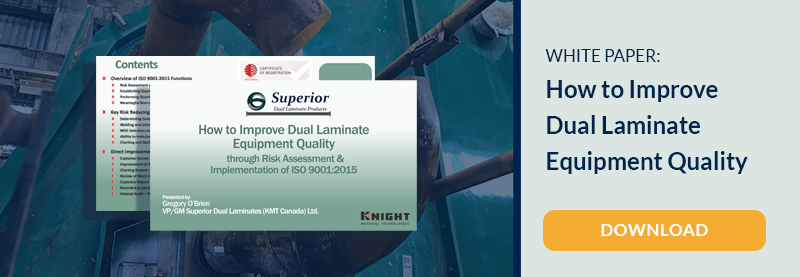Dow and Electro Chemical Manufacturing Team Up to Save $2 MM in Maintenance Costs
Published on: October 17, 2023 Topics: AboutProject earns MTI Global Value Award
The Dow Chemical Company and Electro Chemical Manufacturing (ECM) earned the Materials Technology Institute’s (MTI) 2016 Global Value Award for applying Materials Technology Institute (MTI) Guidebooks as they collaborated on a scrubber repair project that solved Dow’s corrosion problem while also enabling them to save significant time and money.
The two companies earned the award based on eight criteria, including the positive financial, reliability and safety impacts that the project has had on Dow operations. Internal training opportunities as well as standards, procedures and process improvements at ECM also factored into the Value Award Committee’s decision.
The resourceful project team, which included materials engineering experts from both companies, used MTI’s Guide for the Repair & Modification of FRP Equipment and Guide for the Repair & Modification of Lined Equipment (visit the MTI Bookstore) to help evaluate the option of installing a Kynar® PVDF thermoplastic liner in an existing FRP scrubber that was exhibiting end-of-life characteristics due to chemical corrosion.
Dow’s engineering group sought a long-term solution and considered replacing the 13-ft. diameter, 30-ft. high vessel. “We talked about replacing the scrubber, but we looked at the potential project and estimated that it would be very expensive,” reports Abiodun Olawepo, a Process Improvement Engineer at The Dow Chemical Company.
Instead, the project team elected to investigate the potential of a thorough but less problematic solution. Dow’s engineers turned to the industry’s leading supplier of fluoropolymer coatings and linings, ECM, to evaluate the feasibility of applying a thermoplastic liner in the section of the scrubber experiencing the most deterioration from age and chemical exposure.
“We came to the conclusion that we could do a field test to see if the FRP that we had was going to bond very well with the Kynar® sheet liner,” explains Olawepo. “We thought, if we can do this, it could extend the life of the scrubber another 10-15 years. Ultimately, Dow engineers concluded that using the PVDF fluoropolymer liner could provide the protection the unit needed.
Dow selected ISO-9001-certified ECM for repair of its HR3 unit. The team finished the project on time and on budget.
“What they did is already paying dividends for us. We no longer have to repair the scrubber year after year.”
– Abiodun Olawepo, Process Improvement Engineer
The Dow Chemical Company
By avoiding the costs of a replacement vessel, an extended shutdown for its installation, and the associated costs of piping and foundation modifications, Dow realized significant cost savings.
“With the help of Dow’s thorough planning prior to the start of work, our estimated costs, work hours/days and pricing were all in line with our standard expectations,” concludes Erick Olson, Project Manager at ECM. “This challenging field service job went according to plan, on schedule and on budget.”
Additional benefits include lowering the potential for loss of primary containment due to failure and possibly reducing emissions due to the wider chemical compatibility of PVDF versus polyester.



